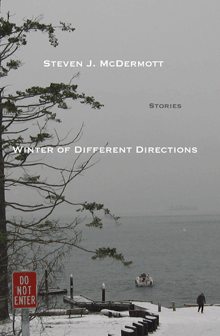Homefront
Be sure to checkout the audio blog that accompanies this post: Listen to the mp3 (5:52 mins, 4 mb) or grab the RSS feed.
I live a few miles from a naval air station and as I write this the A-6s are circling in a familiar pattern, looping around the islands, much lower tonight than usual, and paired, wing to wing. Sometimes it's just a pilot getting in flight time. Other times, though, it's not just the "sound of freedom," but a reminder that we're at war, as the flight patterns become frenetic, banking overhead every 3-4 minutes, turbines in full roar, and this activity goes on for hours, passed midnight, even though they're not supposed to fly that late. Here they come right now, drowning out the music I'm listening to.
Deployment.
A few weeks ago, spared longer than most, the first deaths. Three. It's a small town. Front-page headlines. Everything above the fold.
The local pub where I sometimes hang out is full of fly-boys and the day after the memorial service they are knocking back pints and shots, laughing and talking much louder than usual. It's something I notice, but what I wonder about as I drink my own pint is the effect those deaths must have had—are still having—on the wives, girlfriends, mothers, and other family members of those deployed. Four years without deaths. And now three. No longer immune. If they ever felt that way.
That my thoughts stray from the pilots to the loved ones waiting is a tribute to Kristen J. Tsetsi's novel Homefront, which is an intensely intimate and affecting story of Mia, who's stuck inside a tornado of worry after her boyfriend deploys to Iraq. If you were moved by Tsetsi's STORYGLOSSIA Fiction Prize 2006 winning story "They Three at Once Were One," which was also recently named to the notable list in the Million Writers Award, this novel will immerse you deeper into the untold war story of what those waiting on the homefront experience while their loved ones are deployed.
Immersive is one of the primary criterion by which I judge novels, and I was a 100 pages into Homefront before I looked up from the pages. The beginning is grabber with the conflicted relationship, the impending sense of doom, and the isolation of the narrator. Structurally, it is told in a psuedo-diary format, and that heightens the immersion in two ways. First, by creating the expectation of intimacy and then delivering. And secondly, through the use of compression. Parts of the story are left out—what the narrator knows but doesn't need to write to herself—which is a narrative strategy that creates participation as the reader tries to fill in the gaps. This missing information is also a correlative for what Mia is missing, as the reading experience takes on the same feeling of dislocation that Mia feels.
What I loved most about this novel is the way Tsetsi took risks with her portrayal of Mia, because throughout the novel Mia's behavior—at least from the outside looking in—seems shockingly inappropriate. She doesn't write to Jake. She doesn't send him the care packages he asks for. She doesn't answer the phone when he calls. Meanwhile, she hangs out with a crazed Vietnam vet. And then when she does write to Jake she tells him she hates his mother. This is not the saccharine portrait we are used to seeing in the media of supportive wives and girlfriends stiff upper-lipping their way through deployment. It has the feel, however, of the real war on the homefront.
Maybe someone in the Litblog Co-op will nominate this book for the fall readings, but even if they don't, I'm saying READ THIS! The war isn't just in Iraq, it's in the Homefront, too.
I live a few miles from a naval air station and as I write this the A-6s are circling in a familiar pattern, looping around the islands, much lower tonight than usual, and paired, wing to wing. Sometimes it's just a pilot getting in flight time. Other times, though, it's not just the "sound of freedom," but a reminder that we're at war, as the flight patterns become frenetic, banking overhead every 3-4 minutes, turbines in full roar, and this activity goes on for hours, passed midnight, even though they're not supposed to fly that late. Here they come right now, drowning out the music I'm listening to.
Deployment.
A few weeks ago, spared longer than most, the first deaths. Three. It's a small town. Front-page headlines. Everything above the fold.
The local pub where I sometimes hang out is full of fly-boys and the day after the memorial service they are knocking back pints and shots, laughing and talking much louder than usual. It's something I notice, but what I wonder about as I drink my own pint is the effect those deaths must have had—are still having—on the wives, girlfriends, mothers, and other family members of those deployed. Four years without deaths. And now three. No longer immune. If they ever felt that way.
That my thoughts stray from the pilots to the loved ones waiting is a tribute to Kristen J. Tsetsi's novel Homefront, which is an intensely intimate and affecting story of Mia, who's stuck inside a tornado of worry after her boyfriend deploys to Iraq. If you were moved by Tsetsi's STORYGLOSSIA Fiction Prize 2006 winning story "They Three at Once Were One," which was also recently named to the notable list in the Million Writers Award, this novel will immerse you deeper into the untold war story of what those waiting on the homefront experience while their loved ones are deployed.
Immersive is one of the primary criterion by which I judge novels, and I was a 100 pages into Homefront before I looked up from the pages. The beginning is grabber with the conflicted relationship, the impending sense of doom, and the isolation of the narrator. Structurally, it is told in a psuedo-diary format, and that heightens the immersion in two ways. First, by creating the expectation of intimacy and then delivering. And secondly, through the use of compression. Parts of the story are left out—what the narrator knows but doesn't need to write to herself—which is a narrative strategy that creates participation as the reader tries to fill in the gaps. This missing information is also a correlative for what Mia is missing, as the reading experience takes on the same feeling of dislocation that Mia feels.
What I loved most about this novel is the way Tsetsi took risks with her portrayal of Mia, because throughout the novel Mia's behavior—at least from the outside looking in—seems shockingly inappropriate. She doesn't write to Jake. She doesn't send him the care packages he asks for. She doesn't answer the phone when he calls. Meanwhile, she hangs out with a crazed Vietnam vet. And then when she does write to Jake she tells him she hates his mother. This is not the saccharine portrait we are used to seeing in the media of supportive wives and girlfriends stiff upper-lipping their way through deployment. It has the feel, however, of the real war on the homefront.
Maybe someone in the Litblog Co-op will nominate this book for the fall readings, but even if they don't, I'm saying READ THIS! The war isn't just in Iraq, it's in the Homefront, too.
Labels: Storyglossia Audio Blog



